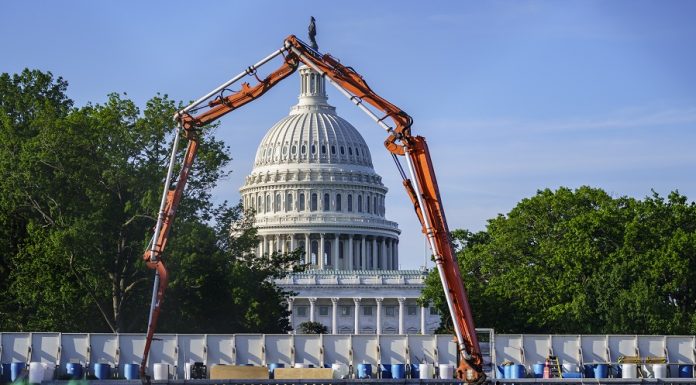(Headline USA) Prospects for an ambitious infrastructure deal were thrown into serious doubt late Friday after the White House reduced President Joe Biden‘s sweeping proposal to $1.7 trillion.
Republican senators rejected the compromise as disappointing, saying “vast differences” remain.
While talks have not collapsed, the downbeat assessment is certain to mean new worries from Democrats that time is slipping to strike a deal.
The president’s team is holding to a soft Memorial Day deadline to determine whether a compromise is within reach.
Skepticism had been rising on all sides over the lack of significant movement off Biden’s $2.3 trillion plan or the GOP’s proposed $568 billion alternative.
“This proposal exhibits a willingness to come down in size,” said White House press secretary Jen Psaki, disclosing the new offer as talks were underway between key Cabinet secretaries and GOP senators at a crucial stage toward a deal.
But after the hourlong meeting, the Republicans quickly rejected the new approach as “well above the range” of a proposal that could win bipartisan support.
The two sides “seem further apart” than when negotiations began, according to a statement from an aide to Sen. Shelley Moore Capito, R-W.Va., the lead negotiator for the group of six GOP senators.
The White House and the Republican senators have been in talks ever since Biden met with a core group of Republican negotiators over the possibility of working together on an infrastructure plan.
The White House dispatched the transportation and commerce secretaries and top aides to Capitol Hill to meet with the Republicans earlier this week, and they had a follow-up video call Friday.
According to a memo obtained by The Associated Press, the administration’s new approach is cutting more than $550 billion from the president’s initial offer.
But the memo makes clear Biden is not interested in the Republicans’ idea of having consumers pay for the new investments through tolls, gas taxes or other fees.
Instead, the administration is sticking with his proposal to raise corporate taxes to pay for the new investment, which is a red line for Republicans.
“Our approach should ensure that corporations are paying their fair share,” said the memo from the administration’s negotiators to the GOP senators.
But Republicans dismissed the new White House offer as “very marginal movement” on the topline without much difference in policy, according to a Republican aide familiar with the negotiations and granted anonymity to discuss them.
The new offer was “disappointing,” the aide said.
But Republicans are adamantly opposed to Biden’s proposed corporate tax increase to pay for the package, refusing to undo the 2017 tax cuts, the party’s signature domestic accomplishment under President Donald Trump.
They reduced the corporate rate from 35% to 21%. Biden proposes lifting the corporate tax to 28%.
“If they’re willing to settle on target a infrastructure bill without revisiting the 2017 tax bill we’ll work with them,” McConnell told Fox’s Larry Kudlow, a former Trump adviser.
Psaki said the new proposal drops the president’s proposed expenditures on broadband as well as roads, bridges and other major investments to meet the Republicans’ lower level.
She said the administration’s proposal also involved “shifting investments in research and development, supply chains, manufacturing and small business” out of the infrastructure talks, since they could be considered elsewhere, noting in Endless Frontiers Act, which is a separate bipartisan bill pending in the Senate.
But Psaki said the president’s team is still pushing for investments in new veterans hospitals, rail projects and green energy investments to fight climate change that Republicans have excluded from their offers.
In all, the White House cut broadband from $100 billion to $65 billion, as Republicans proposed.
It also reduced road and bridges spending by $39 billion, from $159 billion to $120 billion, to move closer to the GOP’s proposal of $48 billion in new funds.
Removing the research and development funds would cut $480 billion, the aides said.
The White House characterized the GOP’s initial $568 billion “Roadmap” proposal as amounting to an estimated $175 billion to $225 billion in “new investment, above current levels Congress has traditionally funded,” according to the memo.
The GOP senators have not publicly disclosed their latest offer.
The statement from Capito’s office said there continue to be vast differences between the White House and Senate Republicans on “the definition of infrastructure, the magnitude of proposed spending, and how to pay for it.”
Adapted from reporting by Associated Press.

